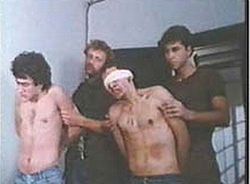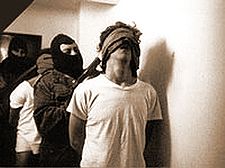.gif)
Night of the Pencils (film)
Encyclopedia
Night of the Pencils (1986
) is an Argentine
drama film
directed by Héctor Olivera
and written by Olivera and Daniel Kon. It is based on the non-fiction book by María Seoane and Héctor Ruiz Núñez.
This motion picture, based on the actual events recorded in history as Night of the pencils
(La noche de los lápices), tells the story of seven teenagers, five boys and two girls, who, during a time of economic and political unrest in Argentina in the mid-1970s, protest for lower bus fares in La Plata
.
The event takes place as Argentina's notorious Dirty War
begins.
 The students want reduced student bus fares, so they take to the streets and protest in support of the boleto estudiantil, or the students' ticket. At first, under Isabel Martínez de Perón's
The students want reduced student bus fares, so they take to the streets and protest in support of the boleto estudiantil, or the students' ticket. At first, under Isabel Martínez de Perón's
government they succeed, but their protests draw hostile attention from the military regime, led by Emilio Eduardo Massera
, that overthrows Peron in 1976. The "leftist agitators" are not tolerated by the new government.
The film demonstrates the ensuing hostile and violent crackdown on student gatherings when police break up a school dance brandishing pistols.
Later, six students are kidnapped in the middle of the night, and the police claim ignorance about their whereabouts. This is the actual event, Night of the Pencils.
Pablo (Alejo García Pintos
), a seventh member of the group, is later arrested by the police. He learns that his friends have been brutally tortured by governmental authorities and that he will receive the same treatment. The police give him electric shocks while radio music masks his cries.
He was fortunate to survive and tell their horrific story. His classmates were never found and became part of the thousands of desaparecido, students who were kidnapped and never seen again by their families or friends.
book, La noche de los lápices, written by María Seoane and Héctor Ruiz Núñez. The book profiles seven high school student activists from La Plata, Argentina, including lone survivor Pablo Díaz, who gives the authors his testimony. The students were kidnapped by the government after protesting for cheaper bus fare.
Pablo Díaz was incarcerated for four years. The other six students became a part of the 236 Argentine teenagers who were kidnapped and disappeared during the military dictatorship.
In March 2003 the film was included in a slate of films shown at the 1st International Film Festival on Human Rights, held in Geneva, Switzerland.
 Critic Manavendra K. Thakur was appreciative of the direction of the film and wrote, "Olivera seems to have kept his integrity mostly intact. He does not shy away from disturbing realities, and he draws a surprisingly complex portrait of the students, their captors, and the students' parents. The film's accomplishment in this regard is considerable and therefore worthy of serious attention...[and] this is especially true of the film's second half."
Critic Manavendra K. Thakur was appreciative of the direction of the film and wrote, "Olivera seems to have kept his integrity mostly intact. He does not shy away from disturbing realities, and he draws a surprisingly complex portrait of the students, their captors, and the students' parents. The film's accomplishment in this regard is considerable and therefore worthy of serious attention...[and] this is especially true of the film's second half."
Caryn James, film critic for The New York Times
, also liked Olivera's work, and wrote, "Mr. Olivera builds his film on irony and contrast, so the visual beauty of the early scenes - the deep blue night in which cars and lights glisten - calls attention to the ominous unseen political dangers. In daylight, the once-beautiful, now crumbling buildings, including the high school itself, become emblems of a country falling apart, not knowing what to preserve from its past."
1986 in film
-Events:*April 12 - Actor Morgan Mason marries The Go-Go's Belinda Carlisle.*April 26 - Actor Arnold Schwarzenegger marries television journalist Maria Shriver.*May - Actress Heather Locklear marries Mötley Crüe drummer Tommy Lee....
) is an Argentine
Argentina
Argentina , officially the Argentine Republic , is the second largest country in South America by land area, after Brazil. It is constituted as a federation of 23 provinces and an autonomous city, Buenos Aires...
drama film
Drama film
A drama film is a film genre that depends mostly on in-depth development of realistic characters dealing with emotional themes. Dramatic themes such as alcoholism, drug addiction, infidelity, moral dilemmas, racial prejudice, religious intolerance, poverty, class divisions, violence against women...
directed by Héctor Olivera
Héctor Olivera
Héctor Olivera is a film director, producer and screenwriter.He works mainly in the cinema of Argentina, but has contributed to numerous films in the United States.-Biography:...
and written by Olivera and Daniel Kon. It is based on the non-fiction book by María Seoane and Héctor Ruiz Núñez.
This motion picture, based on the actual events recorded in history as Night of the pencils
Night of the Pencils
The Night of the Pencils , was a series of kidnappings and forced disappearances, followed by the torture, rape, and murder of a number of young students during the last Argentine dictatorship...
(La noche de los lápices), tells the story of seven teenagers, five boys and two girls, who, during a time of economic and political unrest in Argentina in the mid-1970s, protest for lower bus fares in La Plata
La Plata
La Plata is the capital city of the Province of Buenos Aires, Argentina, and of La Plata partido. According to the , the city proper has a population of 574,369 and its metropolitan area has 694,253 inhabitants....
.
The event takes place as Argentina's notorious Dirty War
Dirty War
The Dirty War was a period of state-sponsored violence in Argentina from 1976 until 1983. Victims of the violence included several thousand left-wing activists, including trade unionists, students, journalists, Marxists, Peronist guerrillas and alleged sympathizers, either proved or suspected...
begins.
Plot

Isabel Martínez de Perón
María Estela Martínez Cartas de Perón , better known as Isabel Martínez de Perón or Isabel Perón, is a former President of Argentina. She was also the third wife of another former President, Juan Perón...
government they succeed, but their protests draw hostile attention from the military regime, led by Emilio Eduardo Massera
Emilio Eduardo Massera
Emilio Eduardo Massera was an Argentine military officer, and a leading participant in the Argentine coup d'état of 1976. In 1981, he was found to be a member of P2...
, that overthrows Peron in 1976. The "leftist agitators" are not tolerated by the new government.
The film demonstrates the ensuing hostile and violent crackdown on student gatherings when police break up a school dance brandishing pistols.
Later, six students are kidnapped in the middle of the night, and the police claim ignorance about their whereabouts. This is the actual event, Night of the Pencils.
Pablo (Alejo García Pintos
Alejo García Pintos
Alejo García Pintos is an Argentine film and television actor.-Filmography :* Ciudad para vivir * Los esclavos felices * Vivir Intentando * Potestad...
), a seventh member of the group, is later arrested by the police. He learns that his friends have been brutally tortured by governmental authorities and that he will receive the same treatment. The police give him electric shocks while radio music masks his cries.
He was fortunate to survive and tell their horrific story. His classmates were never found and became part of the thousands of desaparecido, students who were kidnapped and never seen again by their families or friends.
Cast
- Alejo García PintosAlejo García PintosAlejo García Pintos is an Argentine film and television actor.-Filmography :* Ciudad para vivir * Los esclavos felices * Vivir Intentando * Potestad...
as Pablo Díaz - Vita Escardó as Claudia Falcone
- Leonardo SbaragliaLeonardo SbaragliaLeonardo Máximo Sbaraglia is a prominent Argentine film actor, with extensive credits in both Argentina and Spain.He has also worked in Mexico, and was cast in his first English-language role in Red Lights.-Life and work:...
as Daniel - José María Monje as Panchito
- Pablo Machado as Claudio
- Adriana Salonia as María Clara
- Tina Serrano as Mrs. Falcone
- Héctor BidondeHéctor BidondeHéctor Pastor Bidonde is a noted Argentine theatre, film and television actor.Bidonde was born in La Plata, in 1937. He was a shift worker in a tool & dye factory when, in 1954, he was offered a part in Carlos P. Cabral's play Amarretes...
as Mr. Falcone - Alfonso De Grazia as priest impersonator
- Lorenzo QuinterosLorenzo QuinterosLorenzo Quinteros is an Argentine cinema and theatre actor.Born in Córdoba Province, Quinteros has appeared in many films since his debut in Alianza para el progreso in 1971...
as Raúl
Basis of film
The motion picture was based on the non-fictionNon-fiction
Non-fiction is the form of any narrative, account, or other communicative work whose assertions and descriptions are understood to be fact...
book, La noche de los lápices, written by María Seoane and Héctor Ruiz Núñez. The book profiles seven high school student activists from La Plata, Argentina, including lone survivor Pablo Díaz, who gives the authors his testimony. The students were kidnapped by the government after protesting for cheaper bus fare.
Pablo Díaz was incarcerated for four years. The other six students became a part of the 236 Argentine teenagers who were kidnapped and disappeared during the military dictatorship.
Distribution
Night of the Pencils first opened in Argentina on September 4, 1986. It has been featured at various film festivals including: the New York New Directors/New Films Festival, the Moscow Film Festival, where it was nominated for the "Golden Prize," and the Toronto Film Festival.In March 2003 the film was included in a slate of films shown at the 1st International Film Festival on Human Rights, held in Geneva, Switzerland.
Critical reception

Caryn James, film critic for The New York Times
The New York Times
The New York Times is an American daily newspaper founded and continuously published in New York City since 1851. The New York Times has won 106 Pulitzer Prizes, the most of any news organization...
, also liked Olivera's work, and wrote, "Mr. Olivera builds his film on irony and contrast, so the visual beauty of the early scenes - the deep blue night in which cars and lights glisten - calls attention to the ominous unseen political dangers. In daylight, the once-beautiful, now crumbling buildings, including the high school itself, become emblems of a country falling apart, not knowing what to preserve from its past."
External links
- La noche de los lápices at cinenacional.comCinenacional.comCinenacional.com is a web portal and web-based database about Argentine cinema.The site provides a vast array of information, including: films, television programs, directors, actors, cinematographers, film editors, production designers, and other production professions in Argentina...
. - Night of the Pencils selected scenes at You Tube
- "Freedom Nourishes Argentine Movies" by Shirley Christian at The New York TimesThe New York TimesThe New York Times is an American daily newspaper founded and continuously published in New York City since 1851. The New York Times has won 106 Pulitzer Prizes, the most of any news organization...
, March 29, 1987.

